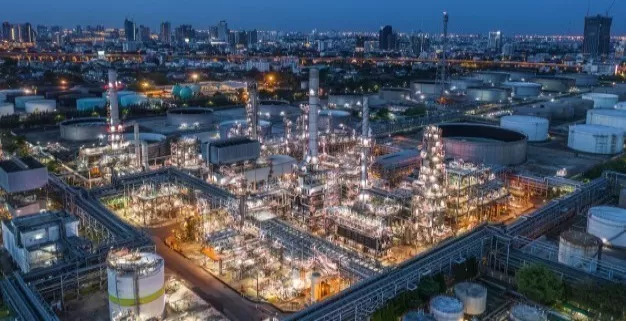
Energy Sector: Oil & Gas Industry in Egypt
Overview
Egypt is considered a significant oil and gas producer in North Africa. The Egyptian Ministry of Petroleum is the governmental authority responsible for the regulation and development of the oil and gas industry in Egypt. The Egyptian Ministry of Petroleum acts mainly through two major entities in the oil and gas fields, EGPC and EGAS. They both focus on oil and gas activities, adapting an effective action plan to organize and handle the activities of oil and gas resources in Egypt.
Egypt, originally, is a Gas producer and the Oil production has developed rapidly in North Africa through the last decades. Egypt has entered into some concession agreements for the exploration, exploitation and production of oil and gas in three main geographical areas: the Western Desert; the Gulf of Suez; and the Mediterranean Sea, where over 50 international oil and gas companies are engaged in the upstream oil and gas sector in Egypt, such as BP, Schlumberger and Halliburton as well as large and small independents and national oil companies.
The most recent bidding round for oil and gas by EGPC took place in 2016 and including 11 exploration blocks in Gulf of Suez and Western Desert.
- Key Legislation
Under the Egyptian Constitution, all oil and gas resources are under the control of the state. Accordingly, only the state can grant rights for exploration and exploitation of oil and gas resources for interested investors.
The main legislations to the petroleum sector include:
- Article 32 of the Egyptian Constitution stipulates that ‘All oil and gas resources, are within the control of the state [...] Granting the right of exploitation of natural resources or public utility concessions shall be by virtue of a law or a period not exceeding thirty (30) years.’
- Law No.66 for year 1953 concerning the fuel raw materials.
- Law No.198 for year 2014 concerning the mineral resources.
- Law No.217 for year 1980 concerning the Natural Gas.
- Law No.61 for year 1958 concerning the Incentives granted to the Natural Gas.
Each of these laws were subjected to many amendments since they were first enacted.
- Regulatory Structure
The Egyptian Ministry of Petroleum is the governmental authority responsible for the Regulation and development of the oil and gas industry in Egypt.
- EGPC
- The EGPC is an economic organization, owned by the Egyptian Ministry of Petroleum.
- The EGPC was established under Law No. 20 of 1976. The EGPC works as a holding company, holds 12 public sector companies, and shares in around 58 joint venture companies with foreign partners including several major international companies.
- The EGPC manages its exploitation and production operations through such joint venture companies.
- EGAS
- The EGAS was established in August 2001 as an entity mandated to focus on the natural gas activities.
- The EGAS is engaged in a wide range of activities, including upstream: exploration, drilling and production of natural gas; and downstream: processing, transmission, distribution of natural gas in the domestic market, and liquefaction and LNG marketing.
- Ganope El-Wadi Petroleum Holding Company (Ganope):
- It was established as one of the main entities of the Egyptian petroleum sector according to prime minister decree no. 1755/2002 in accordance with law no. 203/1991 to manage and supervise all petroleum activities under latitude line 28 (i.e. Mediterranean Sea and Delta Areas).
- Egyptian Petrochemicals Holding Company (ECHEM):
- The Egyptian Petrochemicals Holding Company (ECHEM) was established in January 2002 to manage and develop the Petrochemicals industry in Egypt through new promising areas of investment.
- Concessions
- Only the state can grant rights for exploration and exploitation of oil and gas resources for interested investors.
- In addition, concessions must be granted to the investors by virtue of a law issued specifically for the said concession.
- It can be discussed as follows:
-
-
- Licensing Regime:
-
- The right to explore and exploit oil and gas is awarded by the government under the form of a concession agreement between the successful bidding contractor company (the contractor), the Egyptian state represented by the Ministry of Petroleum and EGAS/ EGPC as the case may be.
- In this regard, the contractors must fulfill some financial and technical requirements to be granted the concession. The contractor does not need to be an Egyptian entity.
- The EGAS or EGPC usually announces a bid round to all the companies interested in exercising the exploration and exploitation activities in the Egyptian territory.
- The bidding companies are required to submit to the EGAS or EGPC two separate sealed envelopes.
- The first envelope contains the technical qualifications of the bidding company, (i.e., the previous exploration experience and activities of the company all over the world including development projects, gas or petroleum production, reserves and the latest technology used, along with the bidding company’s annual report).
- The second envelope contains the commercial parameters based on which the bidding company, if successful, will undertake the exploration and exploitation activities.
- The second envelope will not be opened unless the first envelope is found to satisfy all the requirements and the bidding contractor is technically accepted. After one of the bidding companies wins the bid, negotiations on the draft concession agreement will commence.
- Once the EGAS or EGPC reaches a mutual consent with the contractor; the draft concession agreement will be submitted to the Minister of Petroleum and the parliament for approval and issuance of the relevant law.
- All concession agreements are published in the Egyptian Official Gazette and generally follow a standard format, with slight deviation in each agreement.
- The concession agreement, being an agreement concluded with the state, is one of the most important administrative contracts.
- The state enjoys wide discretionary power to select the contractor company. The most important considerations for the government in selecting the contractor company is its technical, financial and administrative capabilities to ensure proper management of the concession.
- Prevailing Rules
- In addition to the relevant concession agreement, oil and gas exploitation operations are governed by the fuel material Law No. 66 of 1953 (the Fuel Materials Law).
- In the absence of any legal rule under the relevant concession agreement, the exploration and exploitation operations will be subject to the rules of the Fuel Materials Law, its executive regulations and related ministerial decrees, where applicable.
- Term of Concession
- Each concession is divided into two phases. The first is the exploration phase. The second one is the exploitation phase.
- The Exploration phase
- During the exploration phase, the contractor explores the land subject to the concession for oil and/or gas. The contractor does not have the right to extract any material from the ground at this phase.
- The concession agreement shall be terminated if neither oil nor gas that is worth being commercially produced is discovered by the end of the exploration phase.
- The duration of the exploration phase is determined under each concession on a case-by-case basis. The exploration phase period may be extended by the contractor for an additional period as stipulated upon under the relevant concession.
- The Exploitation phase
- Following a commercial oil or gas discovery, the extent of the whole area capable of production shall be mutually agreed upon by EGAS/EGPC and the contractor and will be subject to the approval of the Minister of Petroleum.
- The area will be converted automatically into a development lease without the issuance of any additional legal instrument or permission. The exploitation phase for each development lease is usually 20 years from the date of the relevant discovery. The development lease period may be extended by the contractor for an additional period as stipulated under the relevant concession.
- Development operations under the concession:
- Upon the execution of the development lease, the contractor, along with the EGAS or EGPC will incorporate a joint venture company (the operating company), which will undertake the exploitation activities.
- Each party holds 50 per cent of the shares of the operating company and have the right to nominate four directors to its board of directors.
- The contractor will solely fund all the operations of the operating company.
- Development operations shall be carried out in accordance with good oil field practices and accepted petroleum engineering principles.
- The purpose of the operating company is to act as an agent through which the EGAS or EGPC and the contractor carry out the exploitation operations.
- Termination and revocation of concession
- The concession agreement is terminated by the lapse of its term. In addition, the government has the right to terminate the concession agreement in the following instances:
- If the contractor has knowingly submitted any false statements to the government that were of material consideration for the execution and grant of the concession agreement;
- If the contractor assigns any interest under the concession agreement without following the standard procedures stipulated in the provisions of the related laws and the concession agreement.
- If the contractor is adjudicated bankrupt by a court of competent jurisdiction;
- If the contractor does not comply with any final decision reached as the result of court or arbitration proceedings conducted in accordance with the dispute resolution provisions under the concession agreement;
- if the contractor intentionally extracts any mineral not authorized by the concession agreement to extract or without the authority of the government;
- If the contractor commits any material breach of a concession agreement or of the provisions of the Fuel Materials Law.
- If the government deems that one of the aforesaid causes (other than force majeure events) exists, it will give the contractor 90 days’ written notice to remedy and remove the cause. If, at the end of the 90-day notice period, the cause has not been remedied and removed, the concession agreement may be terminated by a presidential decree.
- Production Restrictions:
- Extracted resource restriction
- The concession agreement prevents the contractor from extracting any resources other than the authorized resource by virtue of the relevant concession agreement.
- Exports
- With respect to the oil or gas produced, priority shall be given to meeting the requirements of the local market as determined by the EGAS or EGPC.
- In case of unavailability of the local market, the EGAS or EGPC and the contractor are entitled to export their respective share in the oil or gas.
- Pricing
- Pricing of the produced oil or gas is usually determined under the concession agreement based on its valuation and will be calculated according to a formula stipulated in the concession agreement.
- In all cases, the oil or gas price can be changed under the concession agreement subject to revaluation process agreed by the parties.
- Distribution of oil and gas
- Once the contractor commences production, the produced oil or gas will be distributed, as follows:
a- Government royalties
- The government shall own and be entitled to a royalty in cash or in kind of around 10 /15 percent of the total quantity of the oil or gas produced and saved from the area covered by the concession during the exploitation phase.
b- Recovery of costs and expenses
- The contractor shall gradually recover all the costs and expenses incurred by the Contractor with respect to the exploration, development and relevant operations under the concession agreement.
- Production sharing
- After the deduction of the royalties and the cost recovery oil and gas, the remaining quantity of oil and gas shall be distributed between the contractor and the EGAS or EGPC in accordance with the percentages stipulated under the relevant concession agreement.
- Transfer of Interest (Farm in & Out)
- Definition of farm in-out agreements:
- A farm-out is an agreement whereby a third party agrees to acquire from one or more of the existing licensees an interest in a production license, and in the operating agreement relating to it.
- Farm-ins are the oil industry term for deals where a company, not at present a licensee on a particular licensed area, can acquire an interest from one of the existing licensees.
- Therefore that farming-in is a way of acquiring a license interest and, conversely, farming-out is a way of disposing of a license interest.
- Governmental and/or regulatory approvals required for the acquisition of oil & gas interests held under a license :
- The transfer of interest, whether directly or indirectly, is subject to the following:
-
-
- The Executive regulation of law No.66 of 1953 (Articles “67-68”).
- Law No.198 for 2014 (Minerals Law), (art.7).
-
- No privileges, rights, duties, or obligations in an existing concession agreements may be assigned or leased to a third party, in whole or in part, directly or indirectly without prior written Government consent.
- Pre-emptive rights reserved to the governmental entities in the event of a proposed assignment of an interest held under a license:
EGPC or EGAS retains pre-emptive rights in the typical concession agreement. Upon receipt of the final terms and conditions of the intended assignment in conjunction with the application for the assignment, EGPC or EGAS has 60 days to exercise their pre-emptive right and acquire the interest intended to be assigned under the same terms and conditions, subject to the government approval.
- Taxation Regime
- The contractor shall be subject to Egyptian Income Tax Law (Law No.91 of 2005), which, under Article 49, prescribes a tax rate of 40.55 per cent on profits derived from oil and gas production.
- The contractor’s annual income for this purpose is determined as per the terms of the concession agreement.
- EGPC or EGAS , as applicable , discharges the contractor’s liability to income tax out of EGPC’s share of petroleum under the concession agreement ; and
- The Model agreement state that EGPC or EGAS, as applicable , the contractor and the operating company are otherwise exempt from all taxes and duties whether imposed by the government or municipalities , including, among others , sales tax , value added tax and taxes on exploration , development , extracting , producing , exporting or transporting of petroleum and liquefied petroleum gas , as well as any and all withholding taxes that might otherwise be imposed on dividends, interest, technical service fees, patent and trade mark royalties , and similar items.
- Stabilization and dispute resolution
(As per the standard provision stated in the Modern Concession Agreement)
- The model agreement state that in the event of any change in regulation that significantly affects the economic interests of the agreement to the detriment of the contractor , the parties to the concession agreement shall negotiate possible or appropriate modifications designed to restore the economic balance that existed when the concession agreement became effective, if the modifications cannot be agreed within certain limited number of days (as applicable in the concession) of notice form the contractor , the dispute resolution provisions will apply.
- Under the model agreement, disputes with the government and the parties are to be resolved through the Egyptian courts.
- Disputes between EGPC and EGAS, as applicable, and the contractor are to be resolved through arbitration under the arbitration rules of the Cairo Regional Center for International Commercial Arbitration (CIRCICA).

 English
English
 العربية
العربية
 中文语言
中文语言
 русский язык
русский язык
 Le français
Le français
 Española
Española


